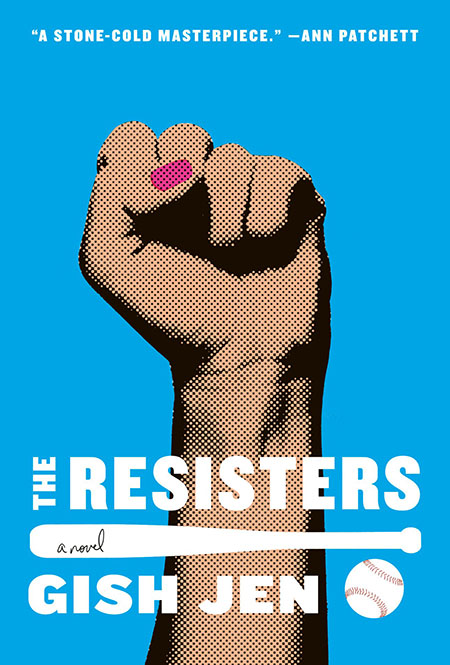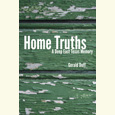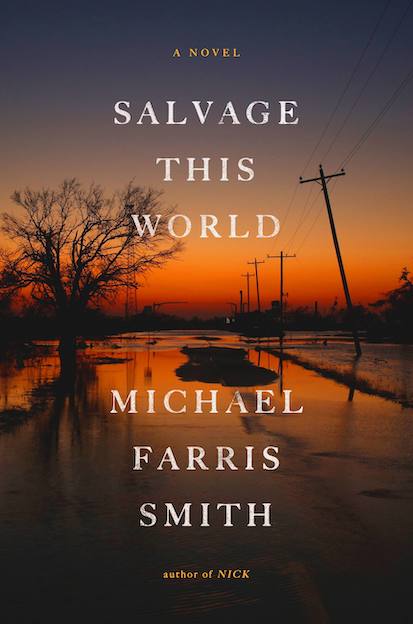The Invisible Man
In Jonathan Safran Foer’s Here I Am, a Jewish father tries to prove he really exists
In preparation for his bar mitzvah—a ceremony he doesn’t want, imposed on him by parents who aren’t religious—Sam Bloch proposes an idiosyncratic interpretation of God’s test of Abraham. The key moment is not when God asks Abraham to sacrifice his son Isaac, but earlier, at the moment when God calls to Abraham, and Abraham responds, “Here I am.” “Whatever God needs or wants,” Sam points out, “Abraham is wholly present for Him, without conditions or reservations or need for explanation.” Why can’t Sam’s father Jacob muster the same attitude?
But Jacob, the central character in Jonathan Safran Foer’s new novel, wanders in existential uncertainty, a mystery to his family and unreal even to himself. At the core of Here I Am, an ambitious and sprawling work of fiction, is the story of Jacob’s attempt to deserve, in his words, “the privilege of being alive.”
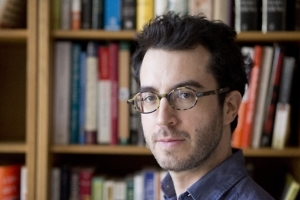
Foer’s objective extends far beyond his portrayal of Jacob’s identity crisis. The gambit of Here I Am is to overlap public and private realms so that the fate of a single Jewish family, living in Washington, D.C., in the recognizable present, represents dilemmas facing the entire Jewish people. The novel’s first line (“When the destruction of Israel commenced…”) signals a coming emergency, and Foer foreshadows it periodically. Jacob’s Israeli cousin Tamir, in the U.S. for Sam’s bar mitzvah, fought to protect the borders of their homeland and speaks proudly of his son stationed in the West Bank. Israel forms the foundation of Tamir’s self-conception, but to Jacob Israel has only a ghostly presence, the remnant of a history that may soon be erased.
The Bloch family is fighting battles on multiple fronts. The patriarch, Holocaust survivor Isaac, doesn’t know whether to die or move into a retirement home. Sam gets suspended from his Hebrew school for inscribing racial epithets on a piece of paper; his bar mitzvah depends on his offering a sincere apology for an act he claims not to have perpetrated. The family dog, whose incontinence causes rifts in the Bloch family, appears to be on his last legs. Jacob and his wife Julia find themselves in the swamp of marital malaise, a state of diminished intimacy and concealed emotions. They have not yet acknowledged that their marriage has reached an impasse, but their sons see how they avoid each other, his father falling asleep “in front of the absence of news” and his mother becoming avid for the Travel section. Sam foresees that they “were going to get divorced and ultimately hate each other and spread destruction like that Japanese reactor.”
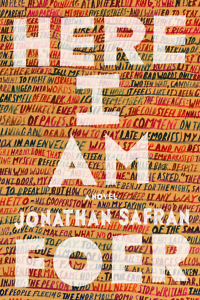 Despite its troubling subject matter, Here I Am remains humorous and at times frolicsome. Foer’s depiction of modern marriage may draw comparisons to Jonathan Franzen’s Freedom, but the tone is notably more comedic. His characters never lose the capacity to laugh at themselves, so their complaints seem self-deprecating, not maudlin. Long paragraphs describe the Blochs’ descent into bourgeois complacency (they “doubled their toiletries; had a teak enclosure built for their garbage bins” and “ordered vitamins from California and mattresses from Sweden”) and detail the way parenthood replaces romance (“Julia could clip newborn fingernails with her teeth, and breast-feed while making a lasagna … but she had forgotten how to touch her husband”). Even the novel’s format is playful: Foer continually experiments with typography, rendering chat-room dialogue and film scripts with equal facility.
Despite its troubling subject matter, Here I Am remains humorous and at times frolicsome. Foer’s depiction of modern marriage may draw comparisons to Jonathan Franzen’s Freedom, but the tone is notably more comedic. His characters never lose the capacity to laugh at themselves, so their complaints seem self-deprecating, not maudlin. Long paragraphs describe the Blochs’ descent into bourgeois complacency (they “doubled their toiletries; had a teak enclosure built for their garbage bins” and “ordered vitamins from California and mattresses from Sweden”) and detail the way parenthood replaces romance (“Julia could clip newborn fingernails with her teeth, and breast-feed while making a lasagna … but she had forgotten how to touch her husband”). Even the novel’s format is playful: Foer continually experiments with typography, rendering chat-room dialogue and film scripts with equal facility.
The imminence of endings haunts this novel. Characters fear death, divorce, and global collapse but wind up missing the unheralded last things that, in retrospect, give family life its sentimental value. “No child knows when he last calls his mother ‘Mama,’” Jacob observes. “No father knows when the book has closed on the last bedtime story he will ever read.” Sam seems especially attuned to the fleeting nature of happiness. He regularly Skypes with Isaac but is “bothered by the knowledge that one such conversation would be their last.” On another level, Foer offers this novel as an act of remembrance for Isaac’s generation of Eastern European Jews who survived the shoah but whose numbers decrease daily. “We know them,” a young rabbi points out, “but our time of knowing them is nearly complete. And then they will be gone forever.”
Foer has endured his share of criticism—for his use of 9/11 as background to a story of love and community in Extremely Loud & Incredibly Close (2005), for unearthing comedy and romance from a rubble of genocide in Everything is Illuminated (2002)—and readers offended by fiction that finds humor in tragedy are encouraged to look elsewhere. For the rest of us, Here I Am offers the full spectrum of human drama, including the disquieting episodes when absurdity and agony coexist.

Sean Kinch grew up in Austin and attended Stanford. He earned a Ph.D. from the University of Texas. He now teaches English at Montgomery Bell Academy in Nashville.
